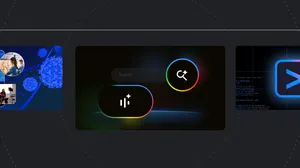Getting to know a research intern: Renata Khasanova
Google's research tackles the most challenging problems in CS and related fields. Being bold and taking risks is essential to what we do, and research teams are embedded throughout Google, allowing our discoveries to affect billions of users each day.
The compelling benefit to researchers is that their innovations can be implemented fast and big. Google’s unique infrastructure facilitates ideas’ speed to market – allowing their ideas to be trialled by millions of users before their papers are even published.
Today we’re talking to PhD Research Intern, Renata Khasanova, a student from École Polytechnique Fédérale de Lausanne in Switzerland. As an intern with one of our Google AI research teams in the Zürich office, Renata’s work focused on noise resynthesis. Read on!

I am currently pursuing my PhD in the signal processing group in EPFL Lausanne under the supervision of Professor Pascal Frossard. My main research topic is extending deep neural network systems to irregular domains such as graphs. For example, we have recently shown that we gain significant accuracy improvement when using graphs for omnidirectional image classification tasks.
Why did you apply for an internship at Google and how supportive was your PhD advisor?
I was always very interested in doing applied research and Google offers the unique opportunity to work on various research topics in application to real tasks. Therefore during my PhD, I decided to apply for an internship in the Compression group led by Jyrki Alakuijala. My supervisor, Professor Frossard, was very supportive and saw this as a great opportunity for me.
What project was your internship focused on?
I worked on improving the new compression algorithm, PIK, designed at Google. My project was really challenging and fun. The main goal of my project was to improve the quality of PIK at the high compression rate.
At Google we care about the responsiveness of web pages, and we look for new ways to make loading faster. Transferring large amounts of data is one reason for slowness, and images constitute a large fraction of that data traffic. This can be mitigated by compressing images more, but higher compression rates reduce visual quality. In this work, we propose a method for resynthesizing the noise that is commonly lost in image compression. We show that resynthesizing the noise increases the perceived quality of the images.
Zoom of dancer’s back with three variations: 1. normal compressed version 2. uncompressed original 3. compressed version with added noise.

In our study we looked at the impact of noise generation within the PIK image compression algorithm. With higher compression densities, details disappear and images look overly smooth. Our noise re-generation system keeps the images looking more natural even when aggressively compressed.
Noise regeneration system improves the perceived quality of lossy compression algorithms by adding 'texture'.

In both experiments we conducted (one focused on perceived quality, the other on perceived authenticity), we saw improvements well above the 95% confidence level. The images are more pleasant for the users and the added noise makes compressed images look more natural.
Did you publish at Google during your internship?
In the end of the internship, we published a paper describing our approach. I really enjoyed the process of writing the paper as all my colleagues were very supportive and helped me a lot. I have also received a lot of help from other teams in Google regarding the user study experiments. Overall the whole process of publishing was very easy and enjoyable.
How closely connected was the work you did during your internship to your PhD topic?
During my internship, I had the opportunity to work on something related, yet quite different from my main research topic at EPFL. I really loved this because it gave me the chance to learn about the topic of compression and its challenges. I have received a lot of support on this from my colleagues at Google. Though this area is not directly related to my PhD topic, my knowledge in graph signal processing helped in determining the direction I should take while working on my internship project.
Did you write your own code?
Writing code is an important part of Google projects. For me it was a great opportunity to practice and receive feedback from very talented engineers. This allowed me to improve both my programming and algorithmic skills. At the end of my internship project we made our code public, which was a very easy process and I received a lot of help on it from the members of my team.
What key skills have you gained from your time at Google?
During my time at Google I have learnt a lot of exciting things about various compression algorithms and methodologies for conducting user studies. I also got hands-on experience with novel Google technologies for coding and code reviews. Furthermore, I participated in a very exciting robotics project with the Google Brain team. This gave me the chance to work with great researchers and engineers as well as allowed me to discover various connections between state-of-the-art machine learning algorithms and neuroscience.
What impact has this internship experience had on your PhD?
My internship at Google broadened my horizons in different ways. It introduced me to various fields such as compression and neuroscience. It also enriched and diversified my knowledge, allowing me to look at my PhD research topic from a wider perspective. My internship inspired me to extend my PhD work to compression algorithms and seek for the possible improvements that can be done in this area using the power of graph signal processing.
Looking back on your experiences now: Why should a PhD student apply for an internship at Google? Any advice to offer?
Google is an amazing place to work. Here you can have an impact on both the research community and the real products. I recommend PhD students apply for an internship, because it is a great opportunity to work with and gain unique experiences from very smart people. At Google, I was amazed by the variety of research directions that people are working on and the freedom they have in choosing them. This combined with access to the most advanced and well-designed infrastructure gives you, as an intern, a great opportunity to do research that will impact people’s lives. Apart from these advantages – Google is a very fun place to work. There were numerous events organized to bring researchers from very different areas together to share knowledge and exchange ideas.







